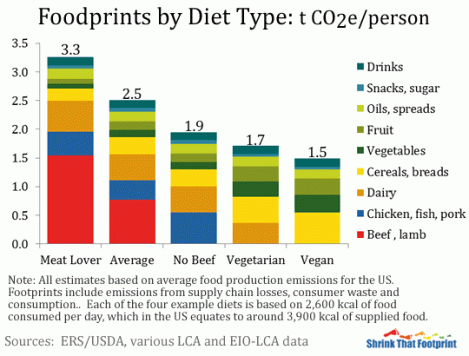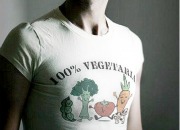I feel like the world is constantly conspiring to get me to eat bacon. That was my first thought when I saw this new study from France claiming that a plant-based diet is not actually the planet-saver we all thought. (My second thought was: WTF, I don’t want to eat bacon.)
The study followed nearly 2,000 diners who self-reported their meals to scientists at the National Research Institute of Agronomy in Marseille; the researchers then tried to determine how much greenhouse gas was emitted in production of the most commonly consumed foods. Let the fuzzy math ensue! Reuters reports:
Overall, about 1,600 grams of carbon dioxide were emitted for every 100 grams of meat produced. That’s more than 14 times the amount of greenhouse gas emitted during the production of fruit, vegetables and starches. It’s also about 2.5 times as much greenhouse gas as that generated by fish, pork, poultry and eggs.
That gap narrowed, however, when the researchers looked at how many grams of carbon dioxide were emitted per 100 kilocalories (kcal) — a measure of energy in food.
The most greenhouse gas — 857 grams — was still emitted to produce 100 kcal of meat, but it was only about three times the emissions from a comparable amount of energy from fruit and vegetables.
Wait wait, hold on, Reuters — the lede of your article says that a plant-based diet “might not be the greenest in its environmental impact.” Now you’re telling me it’s only three times better? Oh, wait, and now you’re telling me it’s no better at all?
And when [senior author Nicole] Darmon and her colleagues looked at what people actually ate to get a certain amount of energy from food every day, they found that the “highest-quality” diets in health terms — those high in fruit, vegetables and fish — were linked to about as much, if not more, greenhouse gas emissions as low-quality diets that were high in sweets and salts. …
Darmon said that’s because people who eat a plant-based diet need to eat more produce to get the amount of energy they’d have in a piece of meat.
Roni Neff of Johns Hopkins, who studies food’s contributions to climate change, expressed skepticism about the new research. “[S]he points out that according to the study’s calculations, people would need to eat about nine pounds of fruit and vegetables to make up for a smaller serving of meat, and that may be unrealistic.” Uhhh, may be!
For a very different take on the planet-saving benefits of not eating bacon, check out Shrink That Footprint’s recent math comparing the impact of five kinds of American diets.

Shrink That Footprint
No, you’re not carbon neutral even if you’re a fruitarian, but there are definitely food choices that can make a difference — and they don’t require a gut-busting nine pounds of produce per meal.


